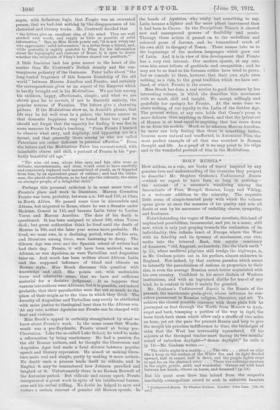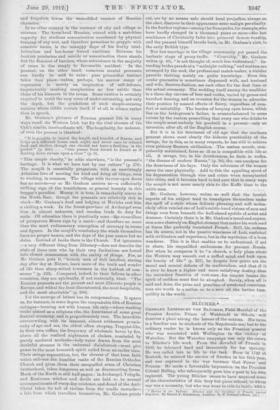HOLY RUSSIA.* 'How seldom, as a rule, are books of
travel inspired by any genuine love and understanding of the countries they purport
to describe ! Mr. 'Stephen Graham's Undiscovered Russia —which we regret to have been so long in noticing— the account of . a summer's wandering among the,
descendants of Finn, Mongol, Russian, Lapp, and Viking, is a welcome addition to the minority. The exquisite little scene of simple-hearted piety with which the volume opens gives at once the measure of his quality and sets all doubt at rest by its assurance of unfailing charm, sympathy, and freshness.
Notwithstanding the vogue of Russian novelists, this land of unplumbed possibilities, immemorial, and yet, in a sense, still new, which is only just groping towards the realization of its
individuality, this .infinite tract of Europe where -the West with its febrility and its tyranny of mechanism ..rim riot,
melts into the leisured :East, this mystic sanctuary of dreamers, "old, fragrant, melancholy, like the black earth" (p. 15), where medieval pilgrims still trudge the highways, is, as Mr. Graham points out in his preface, almost unknown in England. Nor indeed, by that curious paradox which seems to intensify the parochialism of nations in proportion to their size, is even the average Russian much better acquainted with his own country. Confident in hie secret disdain of Western institutions, and With an ingrained dislike for true' of any kind, he is content Co take it mainly for granted.
Mr. Graham's Undiscovered Russia is the Russia of the peasant, the inarticulate grain-giver, whose influence be con- siders paramount in Russian religion, literature, and art. To achieve the closest possible converse with these plain folk he journeyed on foot through the North from Moscow to Arch- angel and back, tramping a portion of the way in lapti, the loose birch-bark shoes which allow only a shuffle of • two miles an hour, yet set the pace for peasant Russia and help to give the moujik his priceless indifference to time, the birthright of mita that the West has irrevocably squandered. Of his sojourn at the thronged timber-mart during its two months' round of unbroken daylight—" dream daylight," he calls it (p. 14)—Mr. Graham writes
"The white night is a reality. . . . The sun . . . stood on edge like a hoop on the surface of the White Sea and its light flooded • upward, half in sunset, half in dawn, and the purple lights crept to and fro on the charmed river. . . 'There was a strange mystery in the night, gentle, mild, and wonderful. Nature sat with head between her hands, elbows on knees, and dreamed." (p. 14).
But his quest soon drew him inland from the seaport's inevitably cosmopolitan crowd to seek in unknown hamlets
• Undiuoverod Russia. By Stephan Graham. London: John Lane. [12s. 6d. net.]
-and forgotten towns the runnodified essence of Russian character. • In no other country is the contrast of city and village so extreme. The town-bred 'Russian, cursed with a matchless capacity for studious concentration unrelieved by physical *training of any sort, and therefore powerless to grapple with
'concrete issues, is the unhappy dupe of his frothy intel- lectualism and hot-house forced emotions. Between his bookish pessimism and suicide or assassination there stands but the flimsiest of barriers, whose subsistence in the majority of cases is due simply to favourable accident. In the peasant, on the other hand, conscious mental processes an hardly be said to exist : pure primordial instinct takes their place—unless, perhaps, his narrow range of
'expression is merely an inspiration of self-defence, :impenetrably masking complexities no less subtle than those of his kinsmen in the towns. Some caution is certainly required to avoid the easy error of under-estimating, not only -the depth, but the gradations of such simple-seeming natures whose riddle reveals itself, if at all, in silence rather than in speech.
Mr. Graham's pictures of Russian peasant life in many -ways recall the Western Irish but for the vital absence of the Celt's nimble, insubordinate wit. The hospitality, for instance, -of even the poorest is identical : .
"It is possible to travel the length and breadth of Russia, and lodge at a different house each might, and never once be refused :food and shelter, though one should net have a farthing in the pocket" (p. 205). . . . "One passes from friend to friend as if floating down stream upon a river" (p. 8).
." This simple charity," he adds elsewhere, "is the peasant's,
heritage.,. It is what we have lost by our culture" (p. 279). The mcrujik is essentially gregarious, with an unwittingly Athenian love of meeting his kind and doing all things, even to washing, in common. The village with its ever-open doors has no secrets—or so Mr. Graham assures us—a sufficiently striking sign of the trustfulness or general honesty in this beggar's paradise. Money, it is true, is remarkably scarce in the North-East, though the peasants are relatively rich in.
stock—Mr. Graham's food and lodging at Novirka cost him a shilling a week. In the forest-province of Archangel even iron is almost unknown, and wooden brads do duty for nails. Of education there is practically none—the councillors .of prosperous Mesen sign by a mark—and therefore no more than the most rudimentary conception of accuracy in terms and figures. In the moujih's vocabulary the winds themselves have no proper names, and the days of the year names but no. 'dates. Instead of books there is the Church. Yet ignorance. —a very different thing from illiteracy—does not describe the state of these Men who by their very limitations are forced into closest communion. with the reality of things. For., as Mr. Graham puts it, "homely men of dull intellect, staring: .day after day at Nature, learn more of the truth and wonder of life than sharp.witted townsmen in. the hubbub of com- 'memo " (p. 223). Compared, indeed, to their fellows in other ..countries, they are spiritually, if not materially, blest. "The Russian peasants are the poorest and most illiterate people in Europe, and withal the least discontented, the most hospitable, and the most charitable" (p. 206).
Yet the scourge of letters has its compensations. It spares us, for instance, in some degree the unspeakable filth of Russian -cottages—teeming not with human life only—where washing ranks almost as a religious rite, the forerunner,of some great festival ceremony, and is proportionately rare. The incredible overcrowding, with its innocent, almost subhuman promis- ouity of age and sex, the oldest often sleeping, Trappist-like, in their own coffins, the frequency of wholesale havoc by fire, above all the realized nightmare of cholera, combated by purely medieval methods—holy water drawn from the most doubtful streams is the universal disinfectant—must give
pause to the most homesick spirit exiled from an earlier time. Their savage superstition, too, the obverse of that keen faith which enlivens the bumbler ranks of the Russian Orthodox Church and gives them. their Iunequalled sense of Christian brotherhood, fakes dangerous as well as disconcerting forms. Muck of the North is still half-pagan: in Archangel, Vologde., and Kostroma witches and devils are held to be normal accompaniments of every-day existence,-and dread of the Anti- Christ takes its toll of victims from the cradle onwards— a fate from which travellers themselves, Mr. Graham points out, are by no means safe should local prejudice, always on the alert, discover in their appearance some malign peculiarity. In the further regions—among the Sa moyedes, for example, who have hardly changed in a thousand years or more—the last semblance of Christanity fades into primeval demon-worship, and the peasant himself breeds back, in Mr. Graham's view, to the early Britieh type.
Nor has marriage in the village community yet passed the barbaric stage of proxy-traffic. "Courtship," Mr. Graham writes (p. 41), "is not thought of, much less understood." In- tending brides parade at a "midnight walking," and matters are arranged by the mit, the professional match-maker,' a sinister parasite thriving mainly on guilty knowledge. Even this ocular guarantee is sometimes dispensed with, and husband and wife, Eastern-fashion, see each other for the first time at the actual ceremony. The wedding itself among the wealthier is a three-day carouse of beer and vodka, varied by games and barefoot dancing, and an occasion for the women to advertise their position by massed effects of finery, regardless of com- fort or suitability. The burden of keeping open house, which lies on the bridegroom's father, is counterbalanced to some extent by the custom prescribing that every one who drinks to the couple must embody his goodwill in a present—only an inversion, after all, of the English course.
But it is in his treatment of old age. that the northern peasant shows most clearly the hideous practicality of the savage, for in this, as in many respects, he has still to achieve even primary Eastern civilization. The useless mouth, com- pulsorily maintained, fares as ill as is compatible with life at all. A savage, too; in his drunkenness, he finds in vodka, "the disease of modern Russia" (p. 36), the one anodyne for the dreariness of his days. Only the soberness of the women. saves the race physically. Add to this the appalling speed of his degeneration through vice and crime when .transplanted into cities, and it becomes bard to feel sure that in many ways the moujik is not more nearly akin to the Kaffir than to the
white man. •
Mr. Graham, however, writes so well that' the brutish aspects of his subject tend to transfigure themselves under the spell of a style whose delicate phrasing, and, soft melan- choly often remind one of Loti's subtle-hued visions of men and things seen from beneath the half-elosed eyelids of artist and dreamer. Certainly there is in Mr. Graham's mood and expres- sion some elusively un-English element that makes hiawork read at times like perfectly translated French., Still, his sadness has its source, not in the passive•weariness of Lati, surfeited with civilization and experience, but in this mysticism of a. horn wanderer. This it is that enables us to understand, if not to share, his unqualified enthusiasm for peasant Itimia. But when he compares, it to. "a church, a holy place. where the Western may smooth out a ruffled mind end look upon the beauty of life" (p. 327), he forgets how grave are the moral and mental defects of its medievalism, and that if it is ever to know a. higher and more. :satisfying, destiny .than the secondary function of rest-cure ,for .unquiet brains, the spirit of serfdom must first be slottglied. Surely, when aU is said and done, the pains and penaltiee of awakened .conscious7 ness are worth to a nation as to a man all,the bovine tra,u-, quillity in the world.























































 Previous page
Previous page